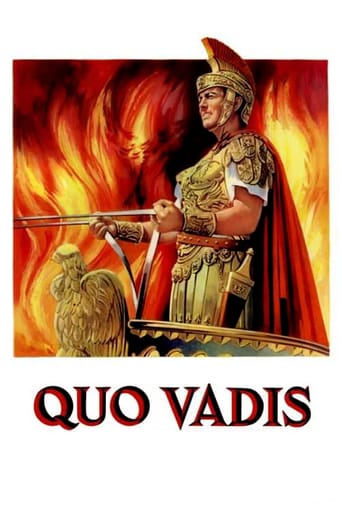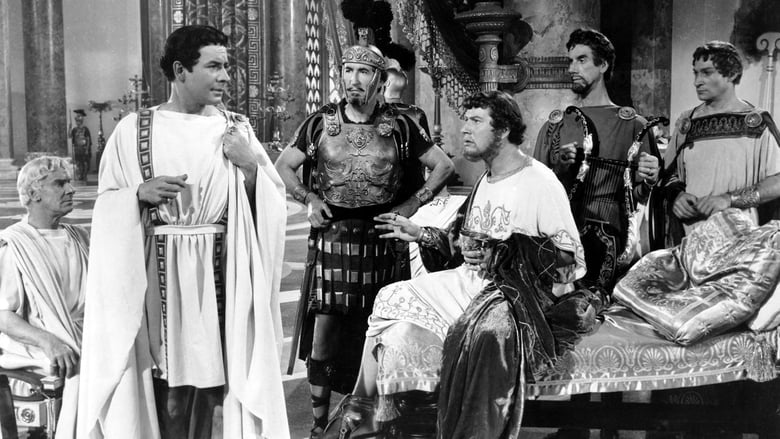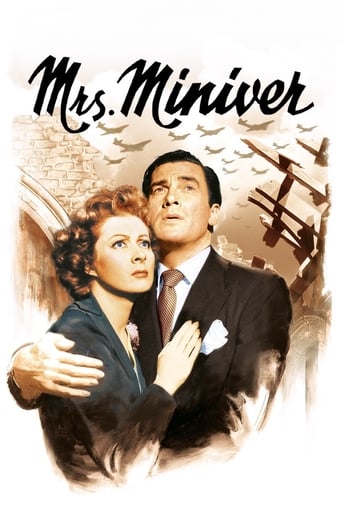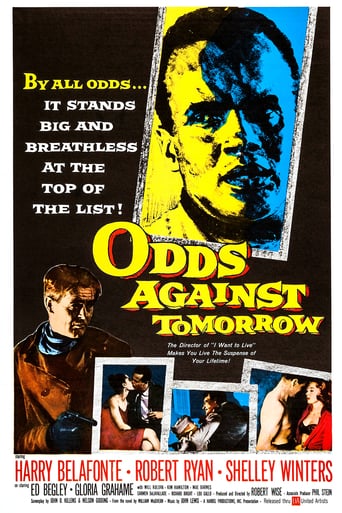Quo Vadis (1951)
After fierce Roman commander Marcus Vinicius becomes infatuated with beautiful Christian hostage Lygia, he begins to question the tyrannical leadership of the despotic emperor Nero.
Watch Trailer
Cast


Similar titles
Reviews
Full disclosure: I've never read the book on which Mervyn LeRoy's Academy Award-nominated "Quo Vadis" is based. I've also heard conflicting stories about the origin of Christianity (namely that the Jesus story has a lot in common with other stories from the region). But whatever the case, it's an impressive movie. I found the most intriguing character to be Nero. He's known as a ruthless, decadent individual, and the movie portrays him as such. Right before the US invaded Iraq, Peter Ustinov got interviewed and said "I don't know whether I played Nero or George W. Bush."It was ironic that Christianity, initially the movement of oppressed peoples, became an instrument of oppression in later centuries. There's always those unintended consequences. But anyway, the movie itself is an epic in the true sense of the word. Admittedly, the movie's so full of itself that one might feel tempted to riff it like on "Mystery Science Theater 3000". But I recommend it.PS: The title means "Where are you going?" in Latin.
Copyright 4 December 1951 by Loew's Inc. An M-G-M picture. New York opening simultaneously at the Astor and Capitol: 8 November 1951. U.K. release: 28 September 1952. Australian release: 19 December 1952 (sic). Sydney opening at the Liberty. 171 minutes.SYNOPSIS: In the first century A.D., Marcus Vinicius, commander of the victorious Roman legions, returns to Rome after his conquests in Britain. He is honored by the Empress Poppaea. Soon he meets and falls in love with Lygia, a Christian hostage and the daughter of a defeated king. She spurns him because of his pagan ways. He the contrives to have Lygia given to him as a slave. But she still refuses to yield to him. Later Marcus follows Lygia to a meeting of the Christians where a sermon by the apostle Peter gives him a better understanding of her religious beliefs. She eventually falls in love with Marcus and consents to become his wife. However, he leaves her in anger when she refuses to abandon her Christian faith. Yet when the mad Emperor Nero sets fire to Rome, Marcus rushes to Lygia's rescue. NOTES: Negative cost: $7 million (including $2 million for an abandoned 1949 version produced by Arthur Hornblow and directed by John Huston, starring Gregory Peck and Elizabeth Taylor).Initial domestic rentals gross: $10.5 million, making it number 2 at the U.S./Canadian box-office for 1952. Equal 4th (with another Robert Taylor epic Ivanhoe) at U.K. ticket windows.Nominated for the following prestigious Hollywood awards: Best Picture (lost to An American in Paris); Best Supporting Actor, Leo Genn (lost to Karl Malden in A Streetcar Named Desire); Best Supporting Actor, Peter Ustinov; Best Color Cinematography (lost to An American in Paris); Color Art Direction (Also lost to An American in Paris); Film Editing (lost to A Place in the Sun); Music Scoring of a Drama or Comedy (also lost to A Place in the Sun); Color Costume Design (lost to An American in Paris).Number 8 in The Film Daily's annual poll of American film critics. Number 9 on the National Board of Review's Ten Best list.Filmed in Italy, at Rome's Cinecitta Studios.COMMENT: This, the first and only sound version of a once super- popular 1896 novel, inaugurated the Hollywood craze for spectacles. It established a formula, faithfully followed in most other epics of ancient and medieval pageantry: (1) Pots of money spent on sets, effects and costumes; (2) prestige actors in lead roles; (3) an always super-glossy but only occasionally imaginative technical finish; (4) an invariably weak script, often with quasi-religious shadings, in which one-dimensional characters muse at length in quaint English on the meanings of love, life, commitment and destiny.Quo Vadis is more entertaining than most of its successors. Although the love story is even more flaccid than usual — Miss Kerr makes her heroine boringly insipid — it does have some uncommonly strong performances, especially from Peter Ustinov, Leo Genn (this was the movie that made them both super-stars, though Mr Genn's reign proved less durable than the far more flamboyant Ustinov's), Patricia Laffan, Buddy Baer (his best role ever), and the ever-reliable Robert Taylor.On the whole, it's Ustinov who makes the most impression. His is by far the most colorful character. He has all the best business and lines — and makes the crowd-pleasing most of them!And of course there's the spectacle elements: richly vivid sets, hordes of extras, see Nero fiddling whilst Rome burns, Christians thrown to the lions, all that sort of stuff, expensively re-staged — and indelibly cheapened in the process. AVAILABLE on an excellent Warner DVD.
It's 30 years after the crucifixion of Jesus Christ. Marcus Vinicius (Robert Taylor) commands the XIV Legion and returns to Rome after a successful 3 year campaign. His uncle Petronius is a close counsel to Emperor Nero (Peter Ustinov). He meets general Aulus Plautius' daughter Lygia (Deborah Kerr) who was the daughter of the king of Lygia taken hostage when she was a child and then adopted. The household is secretly Christian. Vinicius gets Nero to give Lygia as a hostage to him. Lygia slowly teaches the brute Vinicius about the peaceful Christian ways. Poppaea (Patricia Laffan) is the evil wife of the impetulant Nero.The scale is grand. Peter Ustinov is terrific as Nero. Otherwise, the other actors are pretty stiff. Quite frankly, Robert Taylor is too good at playing the dislikeable arrogant general. I don't care about him or even his transformation. It's hard to develop chemistry that way. Deborah Kerr is overacting a bit or maybe she's a little too old to act that way. This needs to have a better couple at the head. They don't work but the other parts work better. Ustinov is the true star in this although the bull wrestling is impressive too.
The biblical epic was one of the most popular movie genres of the 1950s and early 1960s. Unfortunately, most of these films were expensive, Technicolor bores with stiff acting and cheap sensationalism. A few of these films were good/great (Ben-Hur (1959), Barabbas (1961)), some were kitschy fun (The Ten Commandments (1956)), and others were outright awful (The Silver Chalice (1954)). However, most of them were merely average to dull in quality, and that category is where Quo Vadis (1951) falls.The story takes place during Nero's reign and concerns his persecution of Christians after Rome is burned to the ground. The main plot concerns star cross'd lovers Marcus and Lygia, a macho Roman general and a gentle pagan princess-turned-Christian convert. The two encounter historical figures and events as they fall in love and come close to being martyred by the maniacal Nero and his equally vicious wife, Poppaea.The love story is handled poorly. Though Lygia later admits to Marcus that she knew he was the one for her at first sight, their first encounters involve him objectifying her, belittling her intelligence by saying she should not concern herself with philosophy, disgusting her with stories of battlefield gore, and to cap it all off, he forcibly takes her from her adopted family with the hope of legally owning her. Yet Lygia "knew she could come to love him"? She wants to be his wife even though he's shown her no respect? Some would say I'm being too "PC" and that Lygia is representative of 1st century women, but this film is not trying to show a realistic portrait of the 1st century. Many of the events in the film are not historically accurate as it is, so I doubt getting the mindset of 1st century women was on the mind of the screenwriter. It's bad writing, plain and simple.The acting is nothing to brag about (save for two special performances, but we'll get to them soon). Robert Taylor is his stilted, wooden self. Deborah Kerr is stuck in an uninteresting part that she struggles to breathe life into. Patricia Laffan is your standard pagan vamp, shooting bedroom eyes at Taylor while seductively posing on couches.The only two worthy performances come from Leo Glenn as Petronius and Peter Ustinov as Nero. Glenn's sarcastic, smart character is a thousand times more interesting than Taylor's cardboard soldier, and the love between him and his slave girl Eunice is more endearing than the one between Taylor and Kerr. Ustinov is just fantastic, whining and screaming and reciting bad poetry. He steals the show from everyone, making you wish this were a Nero biopic instead.Honestly, if you wanted to watch an old school biblical film concerning the love affair between a Roman soldier and a Christian woman, watch Cecil DeMille's Sign of the Cross (1932). Frederic March is a superior actor to Robert Taylor, and you can never go wrong with Charles Laughton and Claudette Colbert. No, it does not have the budget of this film, but it certainly sustains your interest a great deal more.
















